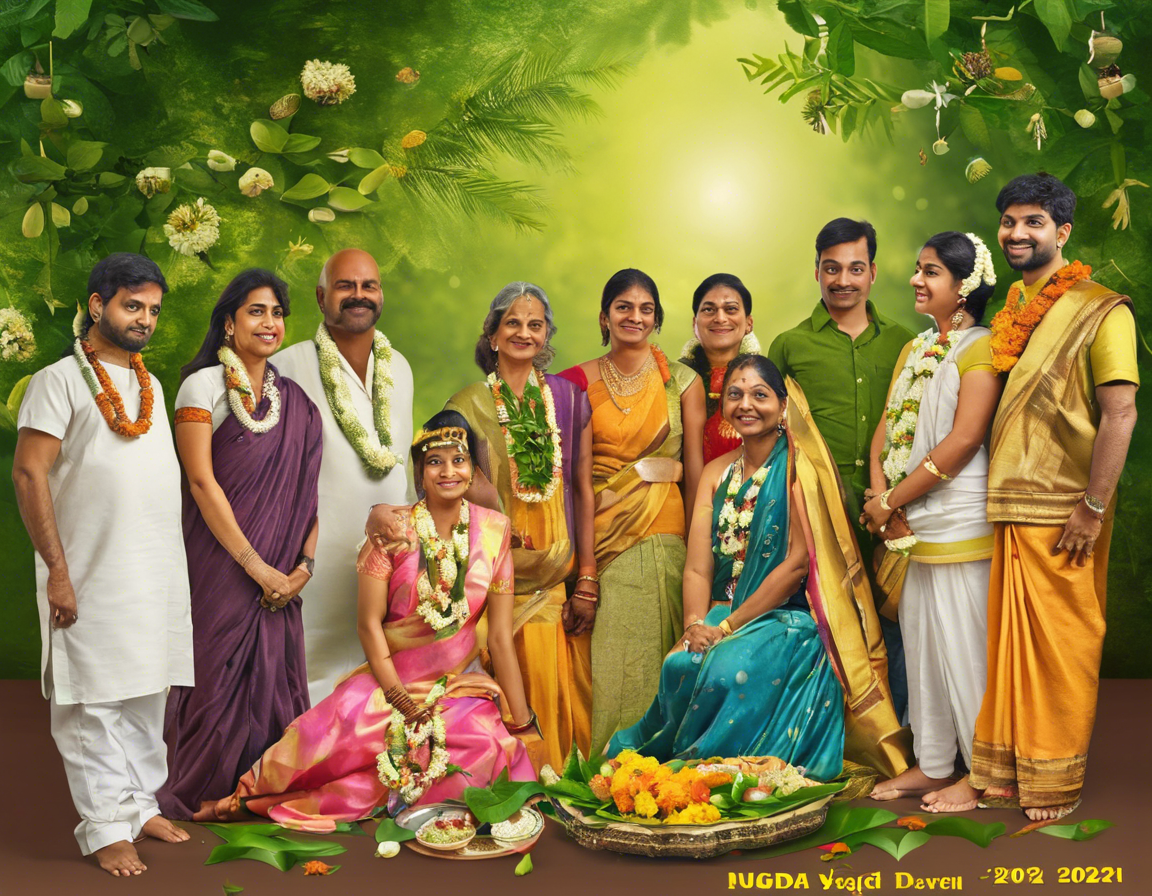Ugadi, also known as Gudi Padwa in Maharashtra, Cheti Chand in Sindh, and Yugadi in Karnataka, is a significant festival celebrated by the people of Telugu and Kannada communities in India. The word “Ugadi” is derived from Sanskrit words “yuga” meaning age and “adi” meaning beginning, signifying the beginning of a new age. This auspicious festival marks the start of the Chaitra month in the Hindu lunisolar calendar and brings with it a sense of new beginnings, fresh hopes, and prosperity.
The Significance of Ugadi:
Ugadi is not just a cultural event but holds deep spiritual and astrological importance. It is believed that Lord Brahma, the creator of the universe, started creation on this day. The festival also signifies the change in the position of the sun and its movement into the first sign of the zodiac, Aries, which is why Ugadi is considered the Hindu New Year.
Ugadi Traditions and Customs:
Ugadi is celebrated with traditional fervor and enthusiasm. Here are some customs and traditions that are followed on this day:
Cleaning and Decoration:
Houses are thoroughly cleaned, and doors are decorated with fresh mango leaves and flowers, indicating a good harvest and prosperity.
Ritual Bath:
People start the day with an oil bath followed by prayers and visits to temples.
Panchanga Sravanam:
One of the main rituals of Ugadi is Panchanga Sravanam, where the yearly calendar (Panchangam) is read aloud to the family, predicting the year ahead.
Ugadi Pachadi:
Ugadi Pachadi, a special dish comprising six flavors – sweet, sour, salty, bitter, spicy, and tangy, is prepared and consumed. This mixture of tastes represents the various emotions encountered in life.
New Clothes and Festive Delicacies:
People wear new clothes, exchange greetings, visit relatives, and indulge in traditional festive delicacies like holige, puliyogare, and obbattu.
Festive Celebrations:
Community gatherings, cultural events, and fairs are organized to celebrate Ugadi with dance, music, and traditional performances.
Predictions for Ugadi 2024:
In 2024, Ugadi will be celebrated on Wednesday, 10th April in accordance with the lunar calendar. As per astrological beliefs, the planetary positions during this time are said to influence the events of the coming year. It is considered an auspicious time for new beginnings, investments, ventures, and seeking blessings for a fruitful year ahead.
FAQs about Ugadi:
Q1: What is the significance of Ugadi Pachadi?
A1: Ugadi Pachadi symbolizes the various flavors of life – sweetness, bitterness, happiness, sadness, anger, and surprise. It teaches us to accept and embrace all aspects of life with equanimity.
Q2: Can non-Hindus celebrate Ugadi?
A2: Yes, Ugadi is a festival that transcends religious barriers, and people from all communities can partake in the celebrations to embrace the spirit of new beginnings and unity.
Q3: How is Ugadi celebrated in different regions of India?
A3: While Ugadi is predominantly celebrated in Karnataka and Telangana, it is also observed in Maharashtra as Gudi Padwa and in Andhra Pradesh as Yugadi with regional variations in customs and traditions.
Q4: What are some traditional dishes prepared during Ugadi?
A4: Some traditional dishes prepared during Ugadi include pulihora (tamarind rice), holige (sweet flatbread), payasam (sweet milk pudding), obbattu (sweet stuffed flatbread), and vada.
Q5: Is there any specific mantra or prayer recited on Ugadi?
A5: People recite the Brahma Purana and offer prayers to Lord Brahma, seeking blessings for prosperity, good health, and success in the coming year.
Q6: Can you explain the significance of Panchanga Sravanam during Ugadi?
A6: Panchanga Sravanam means listening to the yearly predictions based on the Hindu almanac. It is believed to guide individuals in making important decisions and understanding the planetary influences for the year ahead.
Q7: Why are mango leaves and neem flowers used for door decorations during Ugadi?
A7: Mango leaves symbolize prosperity and fertility, while neem flowers have medicinal properties and are believed to ward off evil spirits, creating a positive environment for the new year.
Q8: Is there a specific dress code for Ugadi celebrations?
A8: While there is no specific dress code, people usually wear traditional attire like sarees and dhotis in vibrant colors to mark the festive spirit of the occasion.
Q9: Are there any charitable activities associated with Ugadi?
A9: As part of the festivities, people engage in charity by donating food, clothes, and money to the less fortunate, spreading joy and happiness in the community.
Q10: How does Ugadi reinforce the importance of family and togetherness?
A10: Ugadi brings families together for prayers, feasts, and celebrations, fostering bonding, love, and harmony among relatives, reinforcing the values of unity and kinship.
Ugadi is not just a festival but a celebration of life, love, and togetherness. It reminds us of the cyclical nature of time and the continuous renewal of hope and aspirations. As we gear up to welcome Ugadi 2024, let us embrace the spirit of new beginnings, positivity, and prosperity with open arms.
